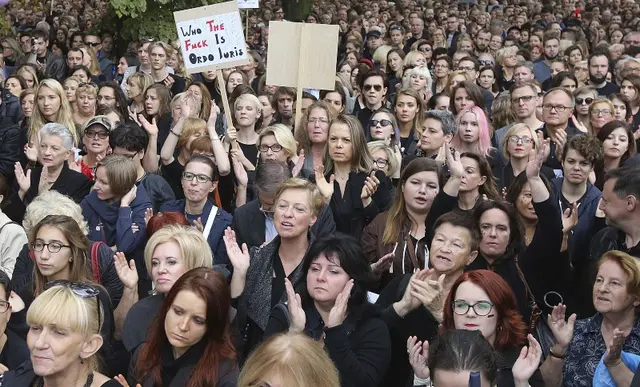Warsaw witnessed Monday hundreds of black-clad women campaigning against a series of issues including mainly a project to alter the existing abortion law.
They headed for the ruling Law and Justice Party (PiS) headquarters to present their demands.
They were met with pro-life organizations supporters who shouted abuses and started sporadic scuffles but police intervention prevented the situation from escalating.
Similar protests took place in other Polish cities including Lodz, Katowice, Bialystok, Wroclaw, Poznan and home of the "Solidarity" movement -- Gdansk.
Most of the participants demanded to uphold the existing law which allows woman to induce abortion in three cases: when pregnancy is a result of criminal act, when it endangers woman's life or when there is a high probability of a grave and irreversible impairment of the fetus or an incurable illness threatening the fetus's life.
The first "Black Protest" (also called "Black Monday") was organized on Oct. 3 in an answer to Polish Parliament's decision to reject a proposal to liberalize current abortion law. Shortly thereafter, it started deliberating about another deeply conservative plan to completely ban abortion but it was also rejected on Oct. 6.
Female workers across the country took part in the walk-out which aimed to bring the economy to a standstill and highlight their disgust at the proposed abortion bill. Pictured: People in an abortion rights campaigners' demonstration 'Black Protest' in Warsaw Photo: Reuters
The existing law, according to a poll by Newsweek Polska, is supported by 74 percent of Poles and only permits around 2,000 legal abortions per year.
The PiS-backed measure, however, does away with these exceptions and threatens jail time for women who break it. Furthermore, it would make it illegal to freeze embryos or to fertilize more than one egg at a time, measures aimed at curbing in vitro fertilization -- a controversial practice in the largely Catholic country.
As a result, the Polish society is split into two groups: conservative pro-life supporters and progressives that either support the existing consensus or want to liberalize the current abortion law.
(APD)
 简体中文
简体中文



